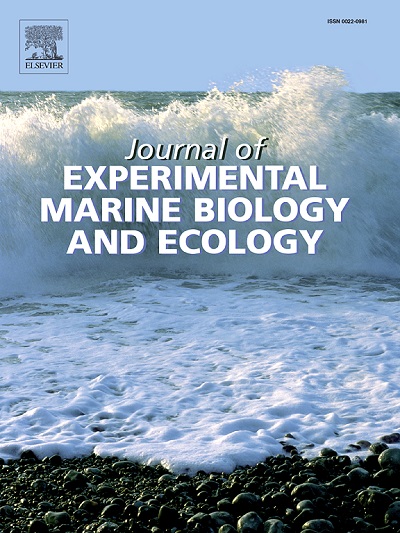Investigating the effects of aluminum exposure on the cell wall of the marine diatom Phaeodactylum tricornutum
IF 1.8
3区 生物学
Q3 ECOLOGY
Journal of Experimental Marine Biology and Ecology
Pub Date : 2025-06-12
DOI:10.1016/j.jembe.2025.152117
引用次数: 0
Abstract
Marine diatoms exhibit varying responses to aluminum (Al) in seawater, influenced by their cell wall composition and structure, yet the mechanisms driving this relationship remain poorly understood. Herein, this study aimed to elucidate how Al interacts with the cell wall of the model diatom Phaeodactylum tricornutum and impacts its physiological and ecological behaviors. To achieve this, novel multidisciplinary approaches that combine X-ray photoelectron spectroscopy, non-invasive micro-test technology, and atomic force microscopy were employed. The results showed that the presence of 100 nM Al in the cultural medium did not have a significant impact on the cell growth of P. tricornutum. However, with an increase in Al concentration to 2 μM, there was a notable decrease in cell growth. Al exposure altered cell wall functional groups, siliceous components, and nitrogen adsorption potential, alongside inducing nanoscale morphological changes, including increased surface roughness and modulus. These structural modifications correlated with reduced copepod grazing and accelerated sinking rates, suggesting that Al-cell wall interactions critically modulate diatom ecological dynamics. This work provides integrated evidence linking Al-induced cell wall remodeling to broader ecological consequences in marine diatoms, advancing understanding of trace metal impacts on phytoplankton ecology.

研究铝暴露对海洋硅藻褐指藻细胞壁的影响
海洋硅藻对海水中的铝(Al)表现出不同的反应,受其细胞壁组成和结构的影响,但驱动这种关系的机制尚不清楚。本研究旨在阐明Al如何与模型硅藻褐指藻细胞壁相互作用并影响其生理生态行为。为了实现这一目标,采用了新的多学科方法,结合了x射线光电子能谱,非侵入性微测试技术和原子力显微镜。结果表明,培养基中添加100 nM的Al对三角棘球蚴的细胞生长没有显著影响。然而,当Al浓度增加到2 μM时,细胞生长明显下降。铝暴露改变了细胞壁官能团、硅质成分和氮吸附电位,同时诱导纳米级形态变化,包括表面粗糙度和模量的增加。这些结构变化与桡足动物放牧减少和下沉速度加快相关,表明铝细胞壁相互作用对硅藻生态动力学具有重要调节作用。本研究提供了将铝诱导的细胞壁重塑与海洋硅藻更广泛的生态后果联系起来的综合证据,促进了对微量金属对浮游植物生态影响的理解。
本文章由计算机程序翻译,如有差异,请以英文原文为准。
求助全文
约1分钟内获得全文
求助全文
来源期刊
CiteScore
4.30
自引率
0.00%
发文量
98
审稿时长
14 weeks
期刊介绍:
The Journal of Experimental Marine Biology and Ecology provides a forum for experimental ecological research on marine organisms in relation to their environment. Topic areas include studies that focus on biochemistry, physiology, behavior, genetics, and ecological theory. The main emphasis of the Journal lies in hypothesis driven experimental work, both from the laboratory and the field. Natural experiments or descriptive studies that elucidate fundamental ecological processes are welcome. Submissions should have a broad ecological framework beyond the specific study organism or geographic region.
Short communications that highlight emerging issues and exciting discoveries within five printed pages will receive a rapid turnaround. Papers describing important new analytical, computational, experimental and theoretical techniques and methods are encouraged and will be highlighted as Methodological Advances. We welcome proposals for Review Papers synthesizing a specific field within marine ecology. Finally, the journal aims to publish Special Issues at regular intervals synthesizing a particular field of marine science. All printed papers undergo a peer review process before being accepted and will receive a first decision within three months.

 求助内容:
求助内容: 应助结果提醒方式:
应助结果提醒方式:


